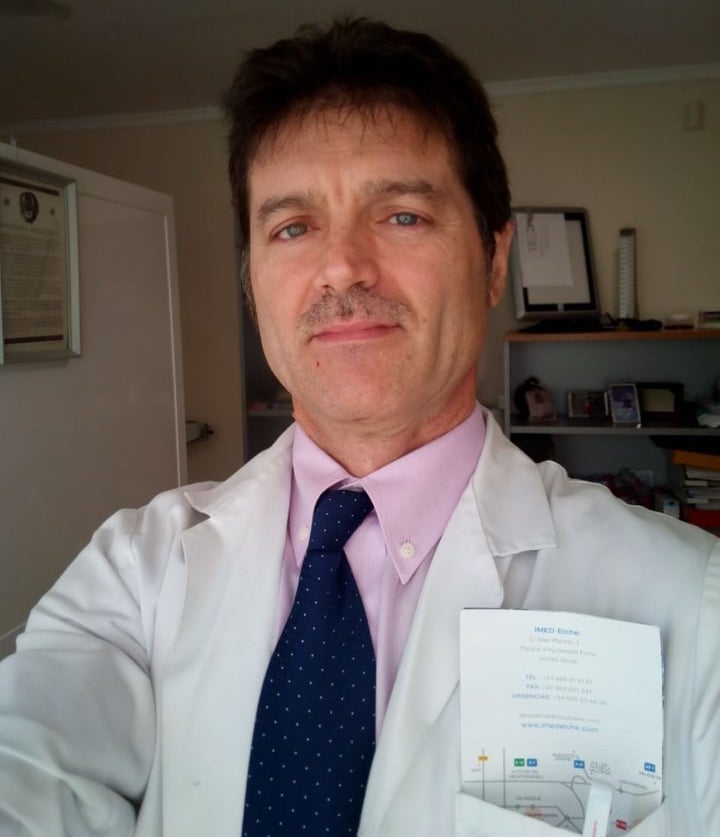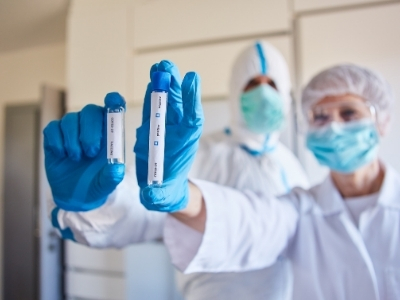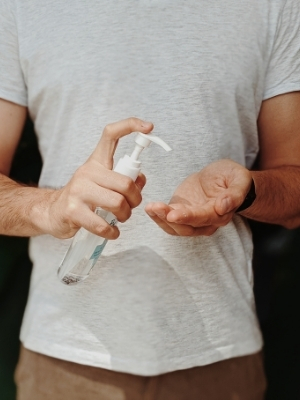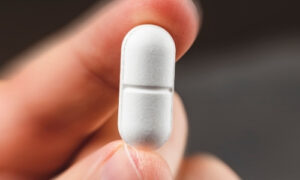
We have visited (having booked a prior appointment) the consultation office of Doctor Perea, General Practitioner at Clínica La Siesta, to inquire about certain aspects of COVID-19. He receives us very kindly in his office, which is spacious, airy, bright, and austere. We would say that he keeps a somewhat “sui generis” order of things. Between jokes he assures us that when he tried to adopt a more conventional order style, he hardly ever could find anything he was looking for.
Dr. Perea has been working at the clinic for 28 years, and in this time he has seen everything. His motto is to always be attentive to the most probable and serious eventuality. He tells us that he was one of the first people who, just at the beginning of February, took preventive measures both personally and in his office. And that’s how he takes care of us today: protected (and protecting us) with pyjamas, a dressing gown, a hat, a face mask, gloves and a screen. It is not easy to work in these new conditions, but lowering security, he assured us, is not an option.
Without further ado and duly accommodated, we proceed to the interview where Dr. Perea will answer the most frequently asked questions related to the COVID-19 pandemic and disease:
The vaccine
– As we all know, the COVID-19 vaccine has arrived, and the first vaccinations have already taken place. Some people are afraid of this vaccine because of the speed with which it has been developed and because of the new technique based on messenger RNA, giving genetic instructions to our cells. Is that fear legitimate?
– This is a very good question. When we apply a vaccine, we are introducing the inactivated or attenuated virus, or a part of it, into the human body to produce a defensive immune response. Modern vaccines are made by introducing a fragment of mRNA (Messenger Ribonucleic Acid) capable of encoding one or more proteins of the virus and thus triggering the immune response. It is done in this way to reduce the danger of the vaccine (neither live nor attenuated virus is introduced), lower its cost, and increase its effectiveness.
As far as we know, it can be safely said that mRNA does not enter the nucleus of cells during this process (ribosomes for protein synthesis are found in the cell cytoplasm), and consequently cannot integrate into the cell genome and cause genetic damage.
Therefore, messenger RNA-based vaccines are safe in this regard.
– What other vaccines would you recommend having, and to whom, right now?
– That of the flu, although its incidence this year is expected to be lower, and that of pneumococcal pneumonia, specifically the 13-valent conjugated polysaccharide, for the prevention of pneumonia and invasive pneumococcal disease in adults, all the more if they are older and if they have pathologies.

The infection
– Is it possible to get infected with coronavirus multiple times?
– Yes, there are already several documented cases around the world, but it is quite sporadic.
– And, if the rapid test shows that antibodies remain in my blood, am I protected?
– Yes, of course; in addition to memory T lymphocytes, which also provide immunity against reinfection.
– And the antigen test?
– Does it play a role in ensuring that the person has protection against the virus? No.


– Can animals also get the disease?
– At the moment there is no evidence that animals play an important role in the spread of COVID-19. However, people who are infected, or suspected of being infected, should prevent contact with people and also with animals and pets.
– Is it true that there are no infections that pass from small children to parents?
– The truth is that young children spread the virus to a lesser extent than we thought, and are less important in transmission than adults.
The virus effects
– Why are different people affected by this virus in such different ways?
– It is due to the viral load developed from the first stages of the infection, which has to do with the activity of the cell membrane proteins (angiotensin-converting enzyme and others), the genetic constitution and the variability of lymphocyte antigens that is different in each individual, and, of course, to the previous pathologies that one has.
– Is it normal when it comes to a virus?
– I would not say that the large variation in response to the virus is normal. And it is precisely a very large immune and inflammatory response that determines the severity of the most serious conditions (such as fulminant bilateral pneumonia).
– Why do smell and taste disappear?
– It is due to the cytopathic effect of the virus on the mucous membrane and tissues, especially on the basal cells, many of which are olfactory sensory “neurons”.
– Is it possible to get them back?
– The majority of patients recover their smell and taste in a few days or weeks.
– What are the after-effects of COVID-19 and why are they so different in different people?
– The sequelae are very varied, predominantly respiratory, and especially serious and long-lasting, with uncertain evolution, in the most serious cases even require further ICU admission. The consequences of the virus are different for the same reasons that we pointed out about the variability of the disease symptoms in different individuals, and, in the event of a collapse of the health system, these consequences can even be fatal.
Preventive measures
– What is the prophylaxis of COVID-19? Is it possible to prevent the disease or reduce the probability of contagion with some practices other than the use of masks and personal hygiene?
– I would summarise it in wearing a face mask, washing your hands frequently, avoiding meetings where food or drinks are consumed and ventilating the rooms as much as possible. Microdroplets, or Flügge, represent the main transmission factor despite face masks and screens.
– Disinfection tips: how should we use the hand sanitisers? (e.g. Is it true that hand sanitisers only work if you apply about 3 ml, not less, of sanitiser and rub for 30 seconds, not less?)
– Yes, since the time of action of an antiseptic is as important as the technique of use and the potency of the compound itself.


– Do we have to disinfect food with bleach (lejía)?
– The food inside the packaging should not be disinfected, except for the usual fruit and vegetable washing (in which 12 drops of purifying water bleach per liter of water ensures disinfection).
It is recommendable that the packaging itself is cleaned using a cloth and a surface cleaner capable of deactivating the virus before storing it in cupboards or the refrigerator.
– Is it safe to go to the gym / theatre, etc.? Is it more advisable to live a more or less normal life or to lock yourself at home until all this situation related to COVID-19 passes?
– My advice would be to attend to necessary tasks and work, go out to shop and visit the doctor, and avoid social events and meetings that you can go without.
About Spain
– Why do you think Spain is one of the countries so highly affected by COVID-19?
– COVID-19 is the responsibility of the Government of Spain both because it is a public health problem that transcends the autonomous communities, and because it is a foreign health issue.
The causes that Spain has been so impacted are ultimately due to errors in the forecast and management of the health crisis by the Government.

During the first wave, there was concealment of information and a serious omission of the duty to prevent (permissiveness for public acts and demonstrations) and to provide the material and human means to fight the pandemic. This led us to record numbers of the infected and deaths, and the need to drastically shut down the economy.
For its part, the Lancet confirms that the de-escalation of the first wave was precipitous and without the system of trackers and tests put in place as was recommended by international scientific institutions and the WHO. This has led us to the second wave, in which it appeared that the scientific committee that advises the Government does not exist, that each autonomous region has managed itself in its own way, and that the real technicians were actually only in the Community of Madrid. I predict that there will be a third wave after Christmas.
To prevent it, I advise all those who are going to have reunions during these holidays to do twice the rapid test for antibodies in the blood and antigens in the respiratory tract (available at Clínica La Siesta).
Treatment and tests
– Could you give us your professional opinion about the use and controversy surrounding Hydroxychloroquine?
– According to data from the AEMPS (Spanish Agency for Medicines and Health Products):
– It is a drug with a well-known safety and efficacy profile that is used as an indicated treatment against malaria and different autoimmune diseases.

– Hydroxychloroquine has been shown to be effective against SARS-CoV-2 in in vitro studies but there is still no solid scientific evidence on its efficacy against COVID-19 in humans.
– In Spain there are currently 16 authorised clinical trials throughout the national territory. In all of them, an intermediate safety analysis has been requested from the promoters.
– There is no data to indicate that the incidence of adverse reactions from the use of hydroxychloroquine has increased in COVID-19 patients.
– Patients who are already taking hydroxychloroquine within or outside of clinical trials for COVID-19 as well as patients undergoing chronic treatment with these drugs should continue taking them and, in any case, maintain their usual follow-ups with their doctors.
Therefore, it is not currently an approved drug for use against COVID-19.
